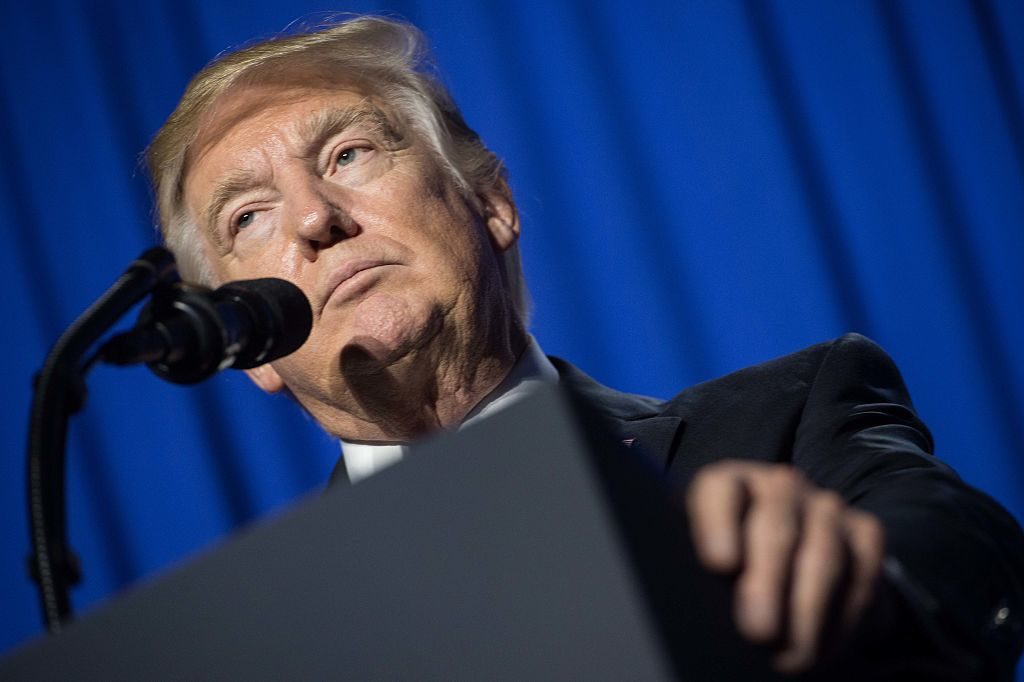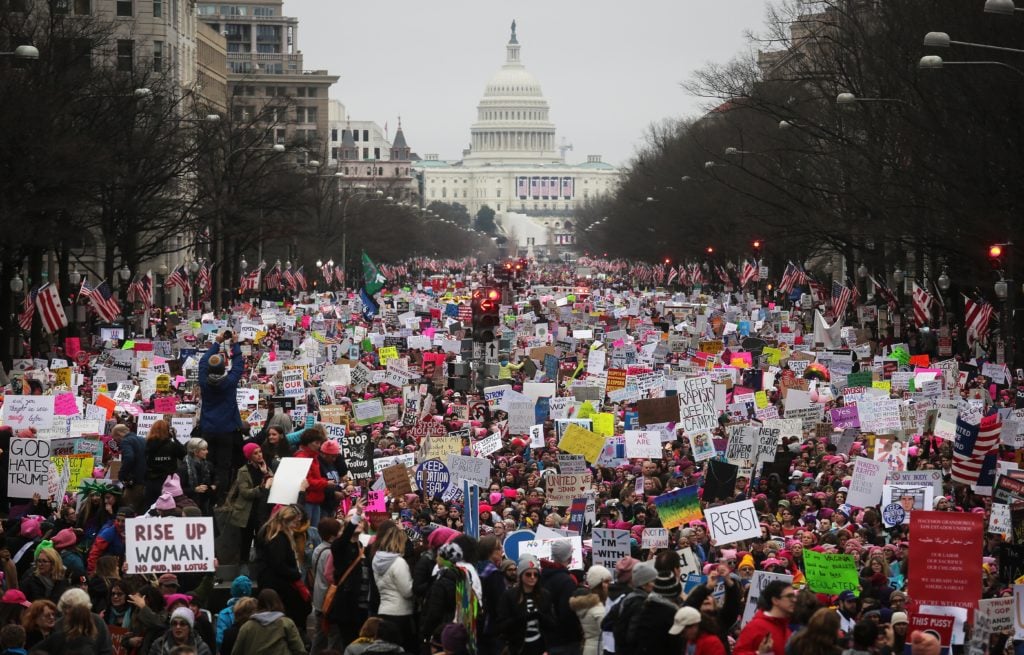Politics
Marina Abramović and Other Outraged Cultural Icons Demand Trump Spare Arts Funding
Jasper Johns, Cindy Sherman, and Richard Serra are among those signing a petition to save the NEA.

Jasper Johns, Cindy Sherman, and Richard Serra are among those signing a petition to save the NEA.

Sarah Cascone

President Donald Trump has confirmed fears that he plans to do away with National Endowment for the Arts (NEA) and National Endowment for the Humanities (NEH), but the nation’s most prominent artists and cultural figures are already fighting back.
Over 230,000 individuals have already signed a petition from PEN America opposing the plan to defund the NEA and NEH. Among the signatories are artists Jasper Johns, Marina Abramović, Barbara Kruger, Cindy Sherman, Laurie Anderson, Kiki Smith, Julian Schnabel, James Turrell, and Richard Serra. Other names on the list include authors Michael Chabon, Judy Blume, and Margaret Atwood, who wrote the increasingly worrying speculative fiction novel The Handmaid’s Tale.
The petition says that the NEA and NEH “promote innovative and creative expression, cultural and artistic understanding, and scholarly research as a basis for an informed democracy.” It goes on to warn that “eliminating these vital agencies would lessen America’s stature as a haven for free thinkers and a global leader in humanity’s shared quest for knowledge,” and would be tantamount to “ushering in a new Dark Ages in America.”

US President Donald Trump speaks to staff at the Department of Homeland Security in Washington, DC, on January 25, 2017.
Courtesy of Nicholas Kamm/AFP/Getty Images.
The America First Budget Blueprint, unveiled on March 15, allows for $1.1 trillion in discretionary spending. The NEA and NEH, which have a collective budget of a comparatively paltry $300 million, were established in 1965 to promote innovation in arts and culture. Although Congress will ultimately write and pass a budget of their own, the newly released blueprint makes Trump’s priorities clear.
National Center for Arts Research (NCAR), at Dallas’s Southern Methodist University, responded to the proposed budget’s unveiling by releasing a paper full of facts and figures demonstrating the positive economic and social impact of the non-profit arts and cultural sector; and the potential dangers of cutting its federal funding.
“Elimination of federal support is not about the money, which only comes to 45 cents per capita for the NEA or .003 percent of the federal budget,” notes the report, which criticized the increasingly prevalent rhetoric “framing arts and culture as elitist and only available and of interest to those with concentrated power.”

Protesters walk up Pennsylvania Avenue during the Women’s March on Washington, with the US Capitol in the background, on January 21, 2017 in Washington, DC. Large crowds are attending the anti-Trump rally a day after US President Donald Trump was sworn in as the 45th US president. Courtesy of Mario Tama/Getty Images.
This narrative falls apart when one looks at the numbers. According to the NCAR report, museums contribute $9.95 billion to the US economy, and federal arts and humanities funding creates jobs for Americans. Its data was collected from US arts and cultural nonprofits with annual budgets over $50,000, of which there are more than 39,000. These cultural institutions can be found all across the country, and are not limited to the big cities. The report states that there were some 467 million visits to these organizations in 2015.
“Retaining and growing federal support for arts and culture first requires shifting public perception to align with reality and taking back control of the rhetoric surrounding its connection to American life,” the report concludes. “The arts being termed ‘elitist’ is an argument founded in anecdote or cherry-picked support. The arts being termed small-d ‘democratic’ is the reality revealed to us through examination of the larger set of facts.”
The Smithsonian Institute has also underscored the importance of the threatened endowment, publishing a fascinating Smithsonian Magazine article highlighting some of the best-known projects funded by the NEA over the years. Without it, we might never have gotten the blockbuster King Tut exhibition at New York’s Metropolitan Museum of Art in 1976, or rediscovered the site of Jamestown, England’s first permanent colony in the US.
Also weighing in on the issue was the Met, with a statement from outgoing director Thomas P. Campbell and president Daniel H. Weiss:
The President’s budget released today proposing the elimination of funding for the NEA, NEH and IMLS is shortsighted and does a terrible disservice to the American people. For more than 50 years, these programs have provided, at modest cost, essential support to arts organizations throughout the country—many times sustaining the arts in areas where people do not have access to major institutions like the Metropolitan Museum. We will join with arts organizations and artists nationwide and work with our supporters in Congress to see that these vital funds are maintained.
“I am deeply troubled by the Trump Administration’s proposed FY2018 budget calling for the elimination of the National Endowment for the Arts,” added Robert Lynch, president and CEO of Americans for the Arts in a statement. “President Trump is the first and only American president who has made such a recommendation.”
He added:
The administration’s budget proposal stems from tired old ideas that show a lack of understanding of the important role that the NEA plays in America today. This thinking could not be more misguided. With only a $148 million annual appropriation, the NEA’s investment in every Congressional District in the country contributes to a $730 billion arts and culture industry in America, representing 4.2 percent of the annual GDP. This arts and culture industry supports 4.8 million jobs and yields a $26 billion trade surplus for our country. President Trump does not yet realize the vast contribution the NEA makes to our nation’s economy and communities, as well as to his own agenda to create jobs ‘made and hired’ in America.
PEN advises concerned citizens to contact their local elected officials and encourage them to protect the NEA and NEH, making note of local projects that receive funding.
Here is a list of some of the petition’s most high-profile signatories, as provided by PEN:
Marina Abramović
Laurie Anderson
Margaret Atwood
Paul Auster
Judy Blume
Robert A. Caro
James Casebere
Rosanne Cash
Vija Celmins
Michael Chabon
Ron Chernow
Sandra Cisneros
Dan Colen
Lydia Davis
Rita Dove
Christopher Durang
Dave Eggers
Nawal El Saadawi
Jules Feiffer
Neil Gaiman
Robert Gober
John Green
Lev Grossman
Jessica Hagedorn
Jenny Holzer
Khaled Hosseini
Siri Hustvedt
Jasper Johns
Alex Katz
Phil Klay
Joseph Kosuth
Nicole Krauss
Barbara Kruger
Glenn Ligon
John Lithgow
Janet Malcolm
Colum McCann
Jay McInerney
Julie Mehretu
Paul Muldoon
Azar Nafisi
Shirin Neshat
Susan Orlean
Robert Pinsky
Francine Prose
Norman Rush
Salman Rushdie
Esmeralda Santiago
Stacy Schiff
Julian Schnabel
Alice Sebold
Richard Serra
Elif Shafak
Cindy Sherman
Gary Shteyngart
Shahzia Sikander
Jane Smiley
Kiki Smith
Andrew Solomon
Stephen Sondheim
Alec Soth
Art Spiegelman
Elizabeth Strout
Mickalene Thomas
Colm Tóibín
James Turrell
Anne Tyler
Ayelet Waldman
Tobias Wolff
Hanya Yanagihara